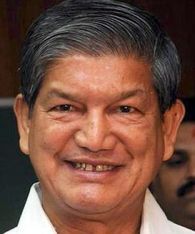With the Bharatiya Janata Party waiting to pull down the Congress-led state government, the new chief minister's duration of service will all depend on the results of the Lok Sabha elections, says Anita Katyal.
 Union Minister Harish Rawat and his supporters had reason to celebrate on Saturday when he finally realised his dream of becoming the Uttarakhand chief minister.
Union Minister Harish Rawat and his supporters had reason to celebrate on Saturday when he finally realised his dream of becoming the Uttarakhand chief minister.
However, the celebrations were tinged with an underlying fear that Rawat’s stint as chief minister could be short-lived as a restless Bharatiya Janata Party is waiting in the wings to pull down the Congress-led state government.
The longevity of the Rawat’s dispensation depends on the results of the Lok Sabha elections. If the recent poll surveys prove correct, and the BJP is able to form the next government at the Centre, a victorious party will feel emboldened to pull down the Congress-led Uttarakhand government.
The Congress is precariously placed in the 70-member Uttarakhand assembly. The grand old party managed to win 32 seats in the 2012 assembly election while the BJP was a close second with 31 seats. The Congress was able to form the government after it managed to get the support of three independent and three Bahujan Samaj Party legislators.
If the BJP’s Uttarakhand unit had its way, it would have swung into action and toppled the Congress government right away by taking full advantage of the growing resentment in the ruling party. However, the BJP’s Central leadership counselled the state leaders to go slow till the Lok Sabha polls.
Admitting it recently, BJP’s Uttarakhand president Tirath Singh Rawat had publicly stated that their party could have dethroned the Congress government but it did not wish to send out any negative signals in the run-up to the Lok Sabha elections.
The BJP is hoping to benefit from the prevailing anti-Congress sentiment in Uttarakhand. Any wrong move at this juncture could backfire. The BJP has, therefore, decided to hold its horses till after the general election.
Besides the BJP, Rawat has also to worry about his own party colleagues. Although there is no doubt that the outgoing chief minister Vijay Bahuguna had become extremely unpopular with the state party unit, Rawat’s appointment has not gone down well with a section in the Congress.
The powerful Brahmin lobby is upset that a Brahmin has been replaced by a Thakur. Rawat, they say, is the third Thakur to be made chief minister after Virbhadra Singh in Himachal Pradesh and Tarun Gogoi in Assam. They also point out that no Brahmin has been appointed as legislature party leader or as head of a state party unit in recent months.
Rawat’s appointment comes at a time when another Thakur -- Digviajya Singh -- has been accommodated in the Rajya Sabha.
Undoubtedly Rawat faces many challenges ahead. He has to streamline the state administration and get the state Congress battle-ready for the crucial Lok Sabha election. This is not going to be easy given the party’s unpopularity and the erosion in its support base.
For the moment, however, it is nothing but a dream come true for Rawat. After all, he came close to occupying the chief minister’s gaddi twice in the past but was beaten to it on both occasions.
The first time he was deprived of the post was in 2002 when the Congress emerged victorious in Uttarakhand’s first state election. As president of the Uttarakhand Pradesh Congress Committee, who led the party to victory, it was considered a foregone conclusion that Rawat was the party’s chief ministerial candidate. But he lost out to his bitter rival, the wily veteran Congress leader Narayan Dutt Tiwari, who was picked by the Congress high command to head the new hill state.
Although Rawat had worked tirelessly for the Congress victory, he was essentially overlooked as he lost Congress President Sonia Gandhi’s trust.
In the run-up to the 2002 assembly poll, the party decided to change a few candidates at the last minute in an effort to accommodate another senior leader Satpal Maharaj’s supporters. This decision was communicated to Rawat, who was in possession of the requisite documents and forms needed by candidates to file their nomination.
Unhappy at the last minute changes, Rawat disappeared and could not be traced till the last date for filing nominations was over. This infuriated Sonia Gandhi and led to his fall from grace. Rawat made matters worse for himself when he attempted to lead a revolt against Tiwari since he enjoyed the support of a substantial number of legislators.
Rawat was once again deprived of the chief minister’s post in 2012. This time the Congress high command decided in favour of Vijay Bahuguna even though Rawat enjoyed the support of 17 of the 32 party legislators. Rawat again threatened a revolt but pulled back at the last minute. He was mollified when his brother-in-law was accommodated in the Rajya Sabha but Rawat’s tantrums were obviously not looked upon kindly by the party president.
Realising that he was losing out, Rawat made a conscious attempt to mend his ways and win back the Congress president’s confidence. This paid off as he was eventually picked for the chief minister’s post on Saturday.
On its part, the Congress leadership realised that it was necessary to send Rawat to Uttarakhand as Bahuguna had lost the confidence of the legislators and was unable to stop the party’s decline in the state.
Rawat’s appointment is part of the leadership’s recent efforts to put its house in order before the coming Lok Sabha elections. Congress vice-president Rahul Gandhi has ensured the entry of new faces in the states, like Sachin Pilot and Arun Yadav, in order to rejuvenate the cadres.
He has also promised radical changes in the selection of candidates for the general election.










